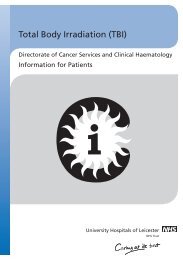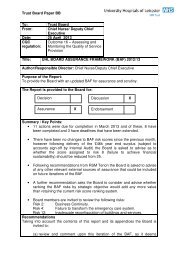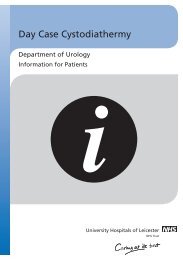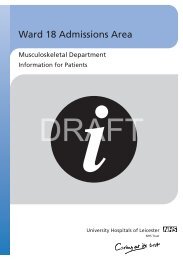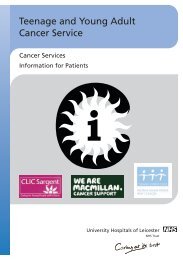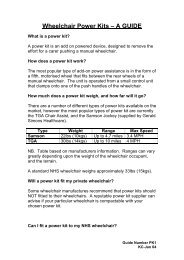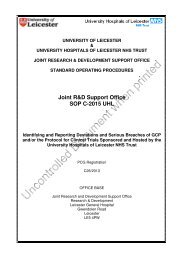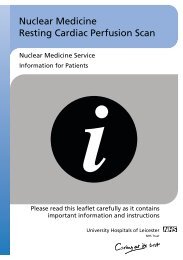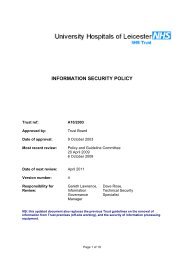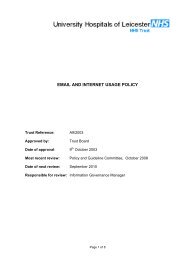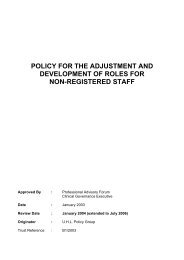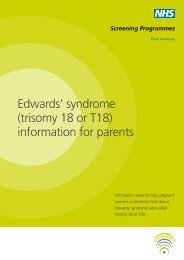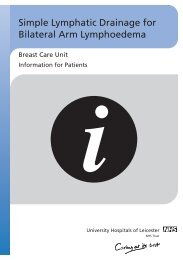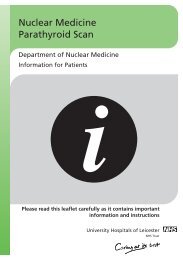Trust Board Paper L University Hospitals of Leicester NHS ... - Library
Trust Board Paper L University Hospitals of Leicester NHS ... - Library
Trust Board Paper L University Hospitals of Leicester NHS ... - Library
Create successful ePaper yourself
Turn your PDF publications into a flip-book with our unique Google optimized e-Paper software.
<strong>Trust</strong> <strong>Board</strong> <strong>Paper</strong> L<strong>University</strong> <strong>Hospitals</strong> <strong>of</strong> <strong>Leicester</strong> <strong>NHS</strong> <strong>Trust</strong>To: <strong>Trust</strong> <strong>Board</strong>From: Kate Bradley,Director <strong>of</strong> Human ResourcesDate: 31January 2013Title:Listening into Action (LiA)Author/Responsible Director:John Adler, Chief Executive/Kate Bradley, Director <strong>of</strong> Human ResourcesPurpose <strong>of</strong> the Report: The purpose <strong>of</strong> the report is to:-1. Describe the LiA approach which is designed to improve staff engagement; one <strong>of</strong>the key objectives <strong>of</strong> the UHL Organisational Development Plan 2013-2015; and2. Set out a proposal to adopt the LiA approach at UHL, the associated costs andbenefits <strong>of</strong> implementing this approachThe Report is provided to the <strong>Board</strong> to provide:-Decision √ Discussion √AssuranceEndorsementSummary / Key Points:The refreshed Organisational Development Plan 2013-2015 for UHL sets out six keythemes. These are aimed at developing the capacity and capability <strong>of</strong> the organisation inorder to facilitate the change and transformation which is required to deliver our strategicvision and objectives. One <strong>of</strong> the six themes within the Organisational Development Plan isto improve two-way staff engagement. A series <strong>of</strong> actions have been set out in the plan thatbuild on existing approaches to enhance <strong>Board</strong>, Executive and Senior Leaders teamengagement and involvement.Having reviewed successful interventions and approaches in this area, we have concludedthat LiA, an outcome oriented approach to engaging the right people in achieving qualityoutcomes, will enhance our performance in this area. The LiA approach was introduced inthe <strong>NHS</strong> approximately five years ago and has evolved over this period and receivednational recognition. It focusses on three key themes:-1. Quality and Safety2. Patient Experience3. Working TogetherApproximately 40 <strong>Trust</strong>s nationally have been involved in LiA and the results <strong>of</strong> the firstCohort <strong>of</strong> national pioneers have demonstrated positive improvements in staff engagementscores. A second cohort is due to commence in February/March 2013 and UHL has been<strong>of</strong>fered the opportunity to join this cohort commencing in February 2013.Listening into Action Report (31 January 2013)1
<strong>Trust</strong> <strong>Board</strong> <strong>Paper</strong> L<strong>University</strong> <strong>Hospitals</strong> <strong>of</strong> <strong>Leicester</strong> <strong>NHS</strong> <strong>Trust</strong>Recommendations:The <strong>Trust</strong> <strong>Board</strong> is asked to support the proposal to join Cohort 2 <strong>of</strong> the LiA. Subject toagreement by the <strong>Board</strong>, further communications and discussions will take place across the<strong>Trust</strong>.Strategic Risk Register3Performance KPIsAppraisalTraining AttendanceSickness AbsenceTurnover RateResource Implications (e.g. Financial, HR):Cost <strong>of</strong> joining LiA Cohort 2 is £70K. A Programme Co-ordinator (8a/8b) and ProgrammeSupport Officer (3/4), c£85k for 12 months. Time commitment from senior leaders is alsokey.Assurance Implications:Forms part <strong>of</strong> the annual Care Quality Commission (CQC) standards monitoring process.Patient and Public Involvement (PPI):Results <strong>of</strong> this paper to be reviewed in conjunction with the patient survey to provide publicstatement <strong>of</strong> <strong>Trust</strong> performance and they will also be examined by the Patient Adviser, whois a member <strong>of</strong> the Workforce and Organisation Development Committee.Equality Impact:Part <strong>of</strong> the analysis examines if there are response differences between staff groupspertaining to the nine protected characteristics.Information exempt from Disclosure:NoRequirement for further review?A further update paper will be provided to the <strong>Trust</strong> <strong>Board</strong> for discussion, assurance andendorsement.Listening into Action Report (31 January 2013)2
<strong>Trust</strong> <strong>Board</strong> <strong>Paper</strong> LREPORT TO:<strong>Trust</strong> <strong>Board</strong><strong>University</strong> <strong>Hospitals</strong> <strong>of</strong> <strong>Leicester</strong> <strong>NHS</strong> <strong>Trust</strong>DATE: 31 January 2013REPORT FROM:SUBJECT:John Adler, Chief ExecutiveKate Bradley, Director <strong>of</strong> Human ResourcesListening into Action Report (LiA)1. INTRODUCTION1.1 Listening into Action was initiated by Sir David Nicolson (2008) and piloted with 12<strong>NHS</strong> <strong>Trust</strong> from around the country. The approach was then further developedthrough 40 pilot <strong>Trust</strong>s in the South West region – four years on and with intensivework with nine Acute <strong>Trust</strong>s a refined approach has emerged. Sir Bruce Keogh,<strong>NHS</strong> Medical Director has endorsed this approach nationally. Ten <strong>Trust</strong>s havecommenced the LiA approach i.e. ‘national pioneers for staff engagement andempowerment’ starting in May 2012 (1 st Wave), and a second wave <strong>of</strong> seven <strong>Trust</strong>sthen started in September 2012.1.2 A third wave is scheduled to commence in March 2013. Nine <strong>Trust</strong>s have alreadysigned up and a place is being kept in reserve for UHL . An investment <strong>of</strong> £70,000will be required to secure a twelve month contract with ‘Optimise Limited’, thecompany who have developed the approach and facilitate adoption across the <strong>NHS</strong>.The following support will be provided as part <strong>of</strong> the contract:• Output Plan <strong>of</strong> a twelve month intensive programme• Telephone and email consultation/coaching on a day to day basis• Access to the web-based LiA Navigator – comprising all the tools andresources we need (refined over three years)• Ongoing learning from the wider network <strong>of</strong> 27 National Pioneer <strong>Trust</strong>s• Provision <strong>of</strong> eight Navigation Events – to support all ten <strong>Trust</strong>s (wave 2)implementing LiA on a parallel basis1.3 Listening into Action forms part <strong>of</strong> a deliberate staff engagement approach andstrong evidence indicates a positive shift in key areas <strong>of</strong> Staff Survey results, fromembedding this approach. A powerful case study is available at:http://www.listeningintoaction.co.uk/LiA-info/docs/0.0.0%20LiA%20Case%20Story.doc1.4 Engagement research suggests that no amount <strong>of</strong> inward investment, restructuringor reconfiguration can, in itself, deliver the step change in quality and safety <strong>of</strong>patient care or the associated improvement in working conditions, environment andculture that staff crave, unless we fundamentally change ‘the way we do change’.1.5 The LiA Framework provides a comprehensive and joined-up way to tackleimprovements in specific service areas, delivered through the direct engagement <strong>of</strong>Listening into Action Report (31 January 2013)3
<strong>Trust</strong> <strong>Board</strong> <strong>Paper</strong> L<strong>University</strong> <strong>Hospitals</strong> <strong>of</strong> <strong>Leicester</strong> <strong>NHS</strong> <strong>Trust</strong>the people who work there. It brings together a holistic view <strong>of</strong> the most likelyopportunities for improvement – based on best practice. Teams are coachedthrough a ‘journey’. It puts staff in the driving seat while also giving UHL leaders a‘methodology’ for enabling change. It also leverages use <strong>of</strong> other improvementinitiatives such as LEAN and the Productive Series by contextualising andsharpening the way in which they are used and applied.1.6 Initial discussions have taken place with senior leaders across the <strong>Trust</strong> at theLeadership Forum, with members <strong>of</strong> the Executive Team and Staff Side colleagues,to gauge the level <strong>of</strong> support and enthusiasm for participating in LiA. All threegroups expressed their commitment to LiA and had a number <strong>of</strong> relevant questionsrelating to the approach. These questions were primarily about implementing theLiA approach in a way that would compliment and assist in delivering the StrategicDirection (October 2012) and objectives <strong>of</strong> the <strong>Trust</strong>.1.7 In successfully implementing the LiA approach a £85k budget will be required tocover pay expenditure and on-costs, with reference to dedicated staffing resource.Based on successful delivery models in place in other participating organisations,the implementation team will comprise <strong>of</strong> a Programme Co-ordinator (Band 8a/8b)and Programme Support Officer (Band 3/4). Along the journey, we will also requirestrong senior manager commitment and considerable input from key UHL teamsincluding HR Learning and Organisational Development, Communication,Transformation and Patient Experience. In total a budget <strong>of</strong> £155k will need to beallocated to the implementation <strong>of</strong> this activity (including £70k LiA joining fees).2. THE LiA ROUTE MAP2.1 Following discussions with 1 st Wave organisations (Wrightington, Wigan and LeighFoundation <strong>Trust</strong> and Hull and East Yorkshire <strong>Hospitals</strong> <strong>Trust</strong>) they have describedtheir initial journey as set out below:Phase One: Committing to a new way <strong>of</strong> working• A dedicated LiA Llead (with administrative support)has been appointed. Theleads operate at senior manager level and report directly to the Chief Executive.• Set up their own LiA Sponsor Group led by the Chief Executive withrepresentation from key clinical and operational influencers (based on influencerather than hierarchy although several members will be executive directors)In participating organisations the Sponsor Group will meet every two weeks for thetwelve month period and beyond. Members <strong>of</strong> the Sponsor Group must haveunwavering commitment to make LiA their personal and collective mission. Theymust visibly champion the LiA approach and demonstrate through their behavioursthat they are committed to it. Their role over the 12 months is to navigate thejourney, make prompt decisions, ‘unblock the way’ and act as link sponsors to frontline staff.Listening into Action Report (31 January 2013)4
<strong>Trust</strong> <strong>Board</strong> <strong>Paper</strong> L<strong>University</strong> <strong>Hospitals</strong> <strong>of</strong> <strong>Leicester</strong> <strong>NHS</strong> <strong>Trust</strong>• Getting leaders on board with the journeyA Launch Conference was held and attended by senior managers and leadersto elicit support, and each sponsor took every opportunity to get buy in andshared ownership through day-to-day contact with clinical and operationalleaders and influencers across the <strong>Trust</strong>.• Launching a ‘fundamental shift’ campaign<strong>Trust</strong>s have embarked on creating a ‘buzz’ around LiA through a proactive andcreative communications campaign.• ‘Pulse Checking’ staff across the <strong>Trust</strong> to see how they are feeling rightnowAdopting a similar approach to UHL local polling, using a simple 10 questionsurvey to get a snapshot view <strong>of</strong> how engaged and how valued staff feel rightnow. Response levels are typically very high with more than 30,000 staffresponses from the 17 National Pioneer <strong>Trust</strong>s over the past six months• Agreeing the outcomes they want to see across the <strong>Trust</strong> based on:Outcome Measures from other National Pioneering <strong>Trust</strong>sPatients Patient Experience ImprovedNo harm to patientsStaff listen and respondStaff Able to make changes happenRecommend the <strong>Trust</strong> as a place to work and to receive careDecrease in bullyingChange to managerial behaviours – inclusive and empoweringOrganisation Know what matters to staffStaff know about LiAGreat stories from LiA and a pipeline to share theseCultural shiftLeadership shiftPhase Two: Engaging staff around what matters• Preparation and hosting five high pr<strong>of</strong>ile, Chief Executive-led LiA Staff eventswith attendance by a rich mix <strong>of</strong> people from across all levels and roles at eachevent• Attendance by <strong>Trust</strong> <strong>Board</strong> and other key influencers has been ensured andbeen described as a critical success factor in demonstrating commitment andopenness to listening to what staff are saying matters to them• The purpose <strong>of</strong> the five LiA staff events is to harness ideas and quicklyconsolidate these into an unprecedented view <strong>of</strong> ‘what matters’ and ‘what gets inthe way’Listening into Action Report (31 January 2013)5
<strong>Trust</strong> <strong>Board</strong> <strong>Paper</strong> L<strong>University</strong> <strong>Hospitals</strong> <strong>of</strong> <strong>Leicester</strong> <strong>NHS</strong> <strong>Trust</strong>• The Sponsor group will then use this information to:o Agree corporate-wide quick wins and enablers in responseo Advertise the opportunity for the ‘First 10’ teams / wards/ departments topioneer adoption <strong>of</strong> LiA for themselves and prepare them ready for actionPhase Three and Four: These phases are associated with empowering staff andembedding the LiA approach in building momentum and traction across the wholeorganisation and include ‘Pass it on’ events. The focus throughout is on staff-ledchanges which make a real difference for patients, for the teams themselves, andfor the <strong>Trust</strong>. There is extensive evidence <strong>of</strong> the impact this ‘new way <strong>of</strong> workinghas’, including positive outcomes for patients, for staff and for the <strong>Trust</strong>. Ultimately,this is a vehicle to improve organisational performance through the directinvolvement <strong>of</strong> the people delivering the service or those supporting them to do so.Michael West (Lancaster Business School) describes LiA as ‘a hallmarkedapproach to delivering the fundamental culture change we need in the <strong>NHS</strong>’.3. RECOMMENDATIONS3.1 It is recommended that the <strong>Trust</strong> signs up to this approach in view <strong>of</strong> the potentialbenefits associated with staff engagement and empowerment, impacting positivelyon delivering high quality patient-centred care and services. This is a key element<strong>of</strong> the Organisational Development Plan (2013/15).3.2 The LiA approach will also have as a key aim, the development <strong>of</strong> the UHL way <strong>of</strong>supporting service improvement. Staff will be placed at the centre <strong>of</strong> change,through altering the <strong>Trust</strong>’s style <strong>of</strong> leadership and its approach to engaging withstaff. Successful implementation will require management behaviours and skillswhich focus on securing the commitment <strong>of</strong> staff, engaging with them to releasetheir creativity and enthusiasm, and supporting them to make change happen.3.3 In adopting the LiA approach, the <strong>Trust</strong> <strong>Board</strong> is asked to confirm approval <strong>of</strong> theallocation <strong>of</strong> £155k budget, including LiA joining fees and pay costs in meetingstaffing resource requirements.Listening into Action Report (31 January 2013)6



